A report shows that Australians have a good perception of Christians and are willing to have spiritual conversations, but also see Christianity as a bad influence in some areas.
 Anglican St Paul's Cathedral in Melbourne, Australia. / Photo: [link]Mitchell Luo[/link], Unsplash, CC0
Anglican St Paul's Cathedral in Melbourne, Australia. / Photo: [link]Mitchell Luo[/link], Unsplash, CC0
Australian research company McCrindle recently released a study called The Changing Faith Landscape in Australia, which shows that 46% of Australians “identify with Christianity”.
Furthermore, 13% defined themselves as unaffiliated believers; 33% of respondents said they were atheists or agnostic; and 6% practised other religions.
Regarding the age, “younger Australians are less likely to identify with Christianity than their older counterparts”. Nearly three-quarters (73%) of the oldest generation still consider themselves Christian while just 38% of the Generation Z respondents said that.
However, among those who identify with Christianity, just 34% attend a Christian church at least once a month, and 47%, never attend.6% said they are “extremely involved” in their Christian faith.
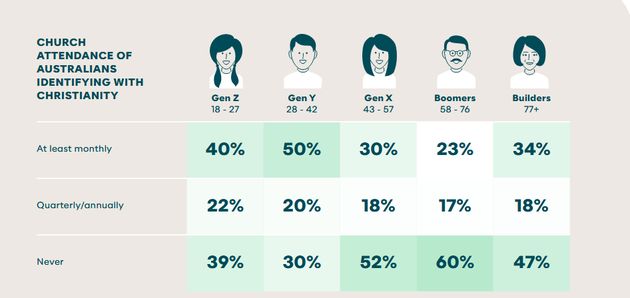
The study also found that “Australians who do not consider themselves a Christian vary in their attitudes towards Christianity […] 28% are cold to Christianity, 27% are warm and 14% are neutral”.
“While there is an openness to Christianity in Australia there are negative influences on Australians’ perceptions of Christianity. The number one negative influence is church abuse (74%), followed by hypocrisy (66%), and judging others (63%). These are the top blockers across every generation”, states the survey.
Moreover, “the Church’s stance and teaching on homosexuality has a massive negative influence for almost half of Generation Z (45%)”.
That was also the worst issue for respondents between 27 and 57 years and people older than 77,while for those between 58 and 76, the way chuches ask for money and the misuse of it is the massive negative influence”.
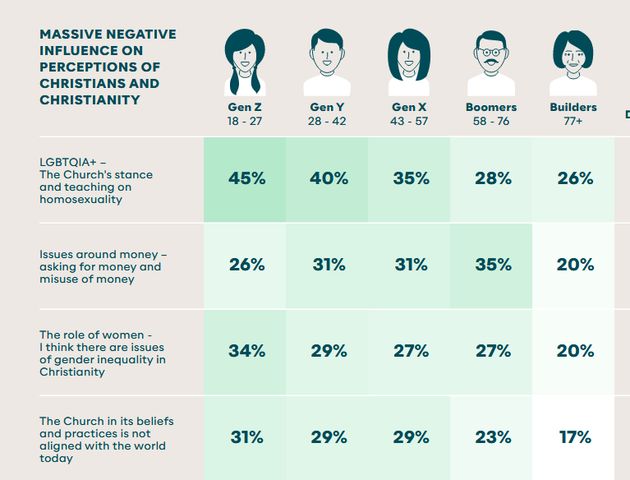
Despite those views, the report points out that “Australians who know at least one Christian, describe them as caring (53%), kind (50%) and loving (46%)”. The most negative characteristics are judgemental (19%), opinionated (17%) and hypocritical (16%).
Regarding churches, “68% know a significant or moderate amount about Jesus’ life compared to just 24% who know a great deal or a lot about the Church in Australia with 22% know nothing at all about it”.
What Australians value most about the work of the churches is that they look after people that are homeless (75%), offer financial assistance/food relief programs (73%) and provide aged care facilities (71%).
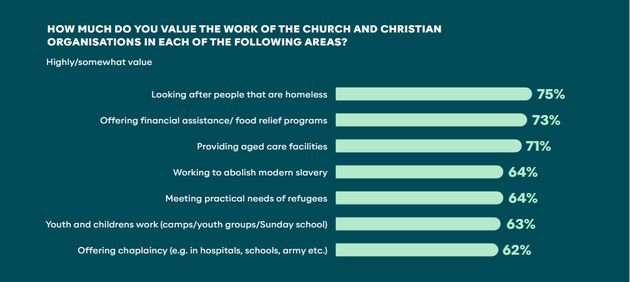
In addition to having in general a good opinion of the work of churches, 68% would be at least slightly likely to attend a Christian church service or event if they were personally invited.
“The key reasons non-religious Australians would accept an invitation would be out of curiosity, to support the person who is asking them and to honour the friendship”, underlines the study.
It also shows that “almost half are extremely or very open to have a spiritual conversation (46%), seeing it as essential or important to discuss and understand another’s viewpoint”.
On the contrary, “21% are not at all open, holding the perspective that discussing another’s viewpoint doesn’t change anything so there is no point in the conversation”.
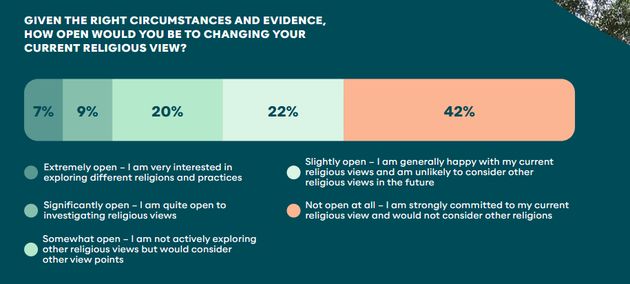
The most willing to having these conversations are the youngest ones (53%), and the least those aged between 57 and 76.
Further than just engaging in a conversation, if presented with the right circumstances and evidence, 58% of Australians are at least slightly open to changing their current religious views.
By age, Generation Z are again the ones who would be at least slightly more open to changing their current religious views (73%), followed by Millennials (70%), Gen X (54%) Baby Boomers (45%) and old people (36%).
“While less people are identifying with Christianity, there is still an openness to engaging with faith. It is important for people who do not believe to see first hand those who live out a genuine faith. Investing in real relationships and creating healthy communities are key for creating opportunities to build the church”, said McCrindle managing director,Sophie Renton.
Australians were also asked what places were more appropriate to talk about spirituality and religion.
According to the survey, “the most appropriate spaces are community events/groups (67%), social media (64%) and mainstream media (64%), while the most inappropriate are the workplace (57%) and dinner parties (46%)”.
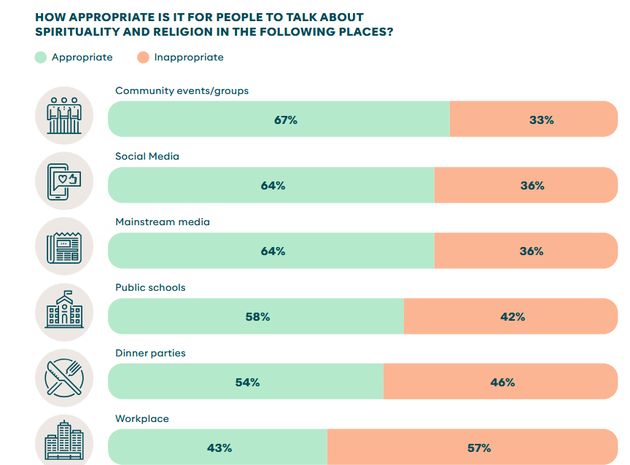
The data for the study was collected in a nationally representative survey of 2,008 Australians aged 18+, from 19th to 30th August 2022 .

Las opiniones vertidas por nuestros colaboradores se realizan a nivel personal, pudiendo coincidir o no con la postura de la dirección de Protestante Digital.
Si quieres comentar o